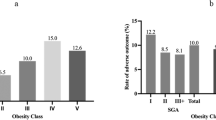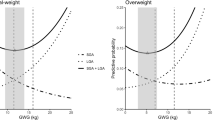Abstract
Objective:
To assess the prognostic validity of the Institute of Medicine/National Research Council (IOM/NRC) week-specific cutoff values for inadequate or excessive total gestational weight gain (GWG) by 4-week intervals.
Study Design:
We merged data from two German cohorts (LMU cohort (all maternal-weight categories) and PEACHES cohort (obese women)) to provide information on GWG for 749 women (365 normal weight, 199 overweight and 185 obese). We calculated the prognostic values for suboptimal and excessive GWG according to the IOM/NRC cutoff values.
Result:
The positive predictive values for excessive total GWG for those who experienced excessive GWG early in pregnancy was 70.1% (95% confidence interval (CI) 60.5; 78.6) as of week 12/1 to 16/0 in normal-weight women, 89.5% (95% CI 75.2; 97.1) and 95.2 (76.2; 99.9) 95.2% (95% CI 76.2; 99.9) as of week 8/1 to 12/0 for overweight and obese women, respectively. In absence of excessive GWG as of week 12/1 to 16/0, normal-weight women had 77.5% (95% CI 77.1; 83.1) probability of not experiencing excessive total GWG (negative predictive value). In overweight and obese women, the negative predictive value was considerably lower up to week 24/1 to 28/0 (60.0% (95% CI 48.8; 70.5) in week 20/1 to 24/0 and 50.6% (95% CI 39.3; 61.9) in week 24/1 to 28/0). Most women with inadequate GWG in the first and second trimester had adequate total final GWG (positive predictive value for total inadequate GWG <50% up to week 16/1 to 20/0 in all groups).
Conclusion:
As women with excessive weight gain can be identified with high confidence if the GWG exceeds the IOM/NRC week-specific cutoff values, interventions may be initiated early in pregnancy.
This is a preview of subscription content, access via your institution
Access options
Subscribe to this journal
Receive 12 print issues and online access
$259.00 per year
only $21.58 per issue
Buy this article
- Purchase on Springer Link
- Instant access to full article PDF
Prices may be subject to local taxes which are calculated during checkout

Similar content being viewed by others
References
Rasmussen KM, Yaktine AL (eds). Weight Gain During Pregnancy: Reexamining the Guidelines. Committee to Reexamine IOM Pregnancy Weight Guidelines. National Research Council: Washington, DC, USA, 2009.
Nehring I, Schmoll S, Beyerlein A, Hauner H, von Kries R . Gestational weight gain and long-term postpartum weight retention: a meta-analysis. Am J Clin Nutr 2011; 94 (5): 1225–1231.
Nehring I, Lehmann S, von Kries R . Gestational weight gain in accordance to the IOM/NRC criteria and the risk for childhood overweight: a meta-analysis. Pediatr Obes 2012; 8 (3): 218–224.
Streuling I, Beyerlein A, Rosenfeld E, Hofmann H, Schulz T, von Kries R . Physical activity and gestational weight gain: a meta-analysis of intervention trials. Br J Obstet Gynaecol 2011; 118 (3): 278–284.
Streuling I, Beyerlein A, von Kries R . Can gestational weight gain be modified by increasing physical activity and diet counseling? A meta-analysis of interventional trials. Am J Clin Nutr 2010; 92 (4): 678–687.
Thangaratinam S, Rogozinska E, Jolly K, Glinkowski S, Roseboom T, Tomlinson JW et al. Effects of interventions in pregnancy on maternal weight and obstetric outcomes: meta-analysis of randomised evidence. BMJ 2012; 344: e2088.
Tanentsapf I, Heitmann BL, Adegboye AR . Systematic review of clinical trials on dietary interventions to prevent excessive weight gain during pregnancy among normal weight, overweight and obese women. BMC Pregnancy Childbirth 2011; 11: 81.
Thorsdottir I, Torfadottir JE, Birgisdottir BE, Geirsson RT . Weight gain in women of normal weight before pregnancy: complications in pregnancy or delivery and birth outcome. Obstet Gynecol 2002; 99 (5 Part 1): 799–806.
Chmitorz A, von Kries R, Rasmussen KM, Nehring I, Ensenauer R . Do trimester-specific cutoffs predict whether women ultimately stay within the Institute of Medicine/National Research Council guidelines for gestational weight gain? Findings of a retrospective cohort study. Am J Clin Nutr 2012; 95 (6): 1432–1437.
Ensenauer R, Gmach J, Nehring I, von Kries R . Increased hemoglobin A(1c) in obese pregnant women after exclusion of gestational diabetes. Clin Chem 2012; 58 (7): 1152–1154.
Ensenauer R PEACHES Studie. In. Kinderklinik und Kinderpoliklinik im Dr. von Hauner'schen Kinderspital cited. Available from https://www.klinikum.uni-muenchen.de/Peaches-Studie/de/index.html.
Daemers DO, Wijnen HA, van Limbeek EB, Bude LM, de Vries RG . Patterns of gestational weight gain in healthy, low-risk pregnant women without co-morbidities. Midwifery 2012; 29 (5): 535–541.
Beyerlein A, Lack N, von Kries R . Within-population average ranges compared with Institute of Medicine recommendations for gestational weight gain. Obstet Gynecol 2010; 116 (5): 1111–1118.
Diet, nutrition and the prevention of chronic diseases. World Health Organization Technical Report Series 2003; 916, World Health Organization: Geneva. i-viii, 1–149, backcover.
Simel DL, Samsa GP, Matchar DB . Likelihood ratios with confidence: sample size estimation for diagnostic test studies. J Clin Epidemiol 1991; 44 (8): 763–770.
R Development Core Team. R: A Language and Environment for Statistical Computing. R foundation for statistical computing, 2011; 13 (4): 497–512.
Stevenson M . epiR: An R package for the analysis of epidemiological data, 2012. R package version 0.9-38 2012.
von Kries R, Nehring I . Reproductive endocrinology: reducing gestational weight gain—a panacea? Nat Rev Endocrinol 2012; 8 (8): 452–454.
Nyaruhucha CN, Msuya JM, Ngowi B, Gimbi DM . Maternal weight gain in second and third trimesters and their relationship with birth weights in Morogoro Municipality, Tanzania. Tanzan Health Res Bull 2006; 8 (1): 41–44.
Phelan S, Phipps MG, Abrams B, Darroch F, Schaffner A, Wing RR . Randomized trial of a behavioral intervention to prevent excessive gestational weight gain: the Fit for Delivery Study. Am J Clin Nutr 2011; 93 (4): 772–779.
von Kries R, Chmitorz A, Rasmussen KM, Bayer O, Ensenauer R . Late pregnancy reversal from excessive gestational weight gain lowers risk of childhood overweight-a cohort study. Obesity (Silver Spring) 2012; 21 (6): 1232–1237.
Wright CS, Weiner M, Localio R, Song L, Chen P, Rubin D . Misreport of gestational weight gain (GWG) in birth certificate data. Matern Child Health J 2012; 16 (1): 197–202.
Lederman SA, Paxton A . Maternal reporting of prepregnancy weight and birth outcome: consistency and completeness compared with the clinical record. Matern Child Health J 1998; 2 (2): 123–126.
Mandujano A, Huston-Presley L, Waters TP, Catalano PM . Women’s reported weight: is there a discrepancy? J Matern Fetal Neonatal Med 2012; 25 (8): 1395–1398.
Carreno CA, Clifton RG, Hauth JC, Myatt L, Roberts JM, Spong CY et al. Excessive early gestational weight gain and risk of gestational diabetes mellitus in nulliparous women. Obstet Gynecol 2012; 119 (6): 1227–1233.
Weisman CS, Hillemeier MM, Downs DS, Chuang CH, Dyer AM . Preconception predictors of weight gain during pregnancy: prospective findings from the Central Pennsylvania Women's Health Study. Womens Health Issues 2010; 20 (2): 126–132.
Simas TA, Liao X, Garrison A, Sullivan GM, Howard AE, Hardy JR . Impact of updated Institute of Medicine guidelines on prepregnancy body mass index categorization, gestational weight gain recommendations, and needed counseling. J Women’s Health (Larchmt) 2011; 20 (6): 837–844.
Dawes MG, Grudzinskas JG . Repeated measurement of maternal weight during pregnancy. Is this a useful practice? Br J Obstet Gynaecol 1991; 98 (2): 189–194.
Acknowledgements
We thank Agnes Melita (Department of Obstetrics and Gynecology, LMU Munich Germany) and Andrea Chmitorz (Division of Epidemiology, Institute of Social Paediatrics and Adolescent Medicine, LMU Munich, Germany) for data gathering and data processing. Dr Ensenauer was supported by the German Federal Ministry of Education and Research (BMBF) Grant 0315088.
Author information
Authors and Affiliations
Corresponding author
Ethics declarations
Competing interests
The authors declare no conflict of interest.
Additional information
Supplementary Information accompanies the paper on the Journal of Perinatology website
Supplementary information
Rights and permissions
About this article
Cite this article
Knabl, J., Riedel, C., Gmach, J. et al. Prediction of excessive gestational weight gain from week-specific cutoff values: a cohort study. J Perinatol 34, 351–356 (2014). https://doi.org/10.1038/jp.2014.22
Received:
Revised:
Accepted:
Published:
Issue Date:
DOI: https://doi.org/10.1038/jp.2014.22
Keywords
This article is cited by
-
Supporting women of childbearing age in the prevention and treatment of overweight and obesity: a scoping review of randomized control trials of behavioral interventions
BMC Women's Health (2020)
-
Effects of a lifestyle intervention during pregnancy to prevent excessive gestational weight gain in routine care – the cluster-randomised GeliS trial
BMC Medicine (2019)
-
Excessive gestational weight gain prior to glucose screening and the risk of gestational diabetes: a meta-analysis
Diabetologia (2015)
-
Early Second Trimester Weight Gain in Obese Women Predicts Excessive Gestational Weight Gain in Pregnancy
Maternal and Child Health Journal (2015)



